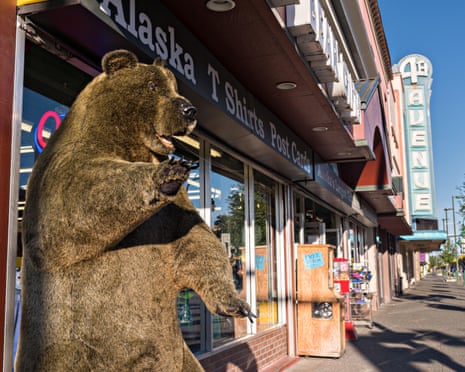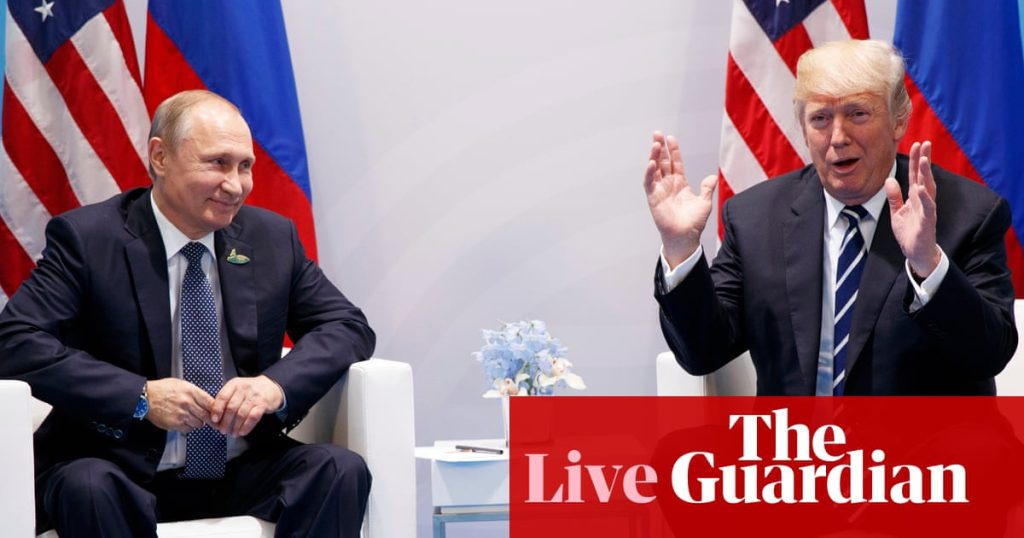More details on Trump-Putin talks emerge, with plans for joint press conference
We are getting a bit more details about the Trump-Putin summit in Alaska, coming from the Russian side, via Reuters.

The meeting will begin 11:30am local time in Alaska, so 20:30 BST, 21:30 CEST.
Yuri Ushakov, the Kremlin’s foreign policy adviser and former Russian ambassador to the US, briefed the media that the two presidents will have a “one on one meeting” with translators, but also hold a “wider meeting” with delegations and a working breakfast.
Ushakov said that Ukraine will be the “central topic” of the conversation, but the pair will also discuss trade and economic cooperation.
The Russian delegation will include foreign minister Sergei Lavrov, defence minister Andrey Belousov, finance minister Anton Siluanov, head of Russian sovereign fund Kirill Dmitriev, and Ushakov, he said.
The two leaders are also expected to give a joint press conference at the end of the summit, he said, which should be a big, big moment.
Share
Updated at 05.31 EDT
Key events
Please turn on JavaScript to use this feature
Zelenskyy visits Starmer in London — in pictures
For more on the visit, follow our UK blog:
(I know, this No10 mug is really cool, but it doesn’t appear that it’s in open sales – a quick Google tells me it was commissioned ‘years ago’ and meant as a gift for foreign leaders visiting London. So if you want one, you need to get elected somewhere, I suppose.)
Share
More details on Trump-Putin talks emerge, with plans for joint press conference
We are getting a bit more details about the Trump-Putin summit in Alaska, coming from the Russian side, via Reuters.
The meeting will begin 11:30am local time in Alaska, so 20:30 BST, 21:30 CEST.
Yuri Ushakov, the Kremlin’s foreign policy adviser and former Russian ambassador to the US, briefed the media that the two presidents will have a “one on one meeting” with translators, but also hold a “wider meeting” with delegations and a working breakfast.
Ushakov said that Ukraine will be the “central topic” of the conversation, but the pair will also discuss trade and economic cooperation.
The Russian delegation will include foreign minister Sergei Lavrov, defence minister Andrey Belousov, finance minister Anton Siluanov, head of Russian sovereign fund Kirill Dmitriev, and Ushakov, he said.
The two leaders are also expected to give a joint press conference at the end of the summit, he said, which should be a big, big moment.
Share
Updated at 05.31 EDT
Big hug from Starmer for Zelenskyy in another show of solidarity, but Kyiv has no illusions about Trump – snap analysis

Luke Harding
Speaking on BBC News
It’s interesting seeing those images, because you’ll remember after that Oval Office meeting, the first place that President Zelensky came to was London, and there was a big demonstrative hug by Keir Starmer, the prime minister, of Zelensky, a sort of show of solidarity after a bruising encounter with Trump and JD Vance.
I don’t think Zelensky can trust Donald Trump. The Ukrainians, since that disastrous episode, have been doing everything they can to basically … fix relations with America, with Washington, and that strategy has played out, and we have to sort of see where they are tomorrow.
But I think if Trump ends up, after his meeting with Putin, blaming Zelenskyy for the war, suggesting he is the problem, the obstacle to peace, the obstacle to a ceasefire and meaningful progress, no one in Kyiv will be surprised by that.
Share
Updated at 04.55 EDT
Zelenskyy arrives at Downing Street for talks with Starmer
Meanwhile, Ukrainian president Volodymyr Zelenskyy has just arrived at Downing Street for talks with UK prime minister Keir Starmer, who greeted him with a big hug.
The pair briefly chatted outside the reach of microphones, and did not respond to any questions shouted by reporters.
His most senior aide, Andriy Yermak, was also seen as part of the Ukrainian delegation going into the building.
Share
Spain wildfires are ‘clear warning’ of climate emergency, minister says
Sam Jones in Madrid, Helena Smith in Athens and agencies
The heatwave-fuelled wildfires that have killed three people in Spain over recent days, devouring thousands of hectares of land and forcing thousands of people from their homes, are a “clear warning” of the impact of the climate emergency, the country’s environment minister has said.
Speaking on Wednesday morning, as firefighters in Spain, Greece and other Mediterranean countries continued to battle dozens of blazes, Sara Aagesen said the 14 wildfires still burning across seven Spanish regions were further proof of the country’s particular vulnerability to global heating.
Aagesen said that while some of the fires appeared to have been started deliberately, the deadly blazes were a clear indicator of the climate emergency and of the need for better preparation and prevention.
“The fires are one of the parts of the impact of that climate change, which is why we have to do all we can when it comes to prevention,” she told Cadena Ser radio.
“Our country is especially vulnerable to climate change. We have resources now but, given that the scientific evidence and the general expectation point to it having an ever greater impact, we need to work to reinforce and professionalise those resources.”
The Spanish government on Wednesday said it has asked the European Union for its help, in particular for two water-bombing planes. “We officially asked tonight” for the assistance, interior minister Fernando Grande-Marlaska told Cadena Ser.
Neighbouring Portugal deployed more than 2,100 firefighters and 20 aircraft against five big blazes, with efforts focused on a fire in the central municipality of Trancoso that has raged since Saturday.
Strong gusts of wind had rekindled flames overnight and threatened nearby villages, where television images showed local people volunteering to help firefighters under a thick cloud of smoke.
In Greece, which requested EU aerial assistance on Tuesday, close to 5,000 firefighters were battling blazes fanned by gale-force winds nationwide. Authorities said emergency workers were waging a “a titanic battle” to douse flames still raging through the western Peloponnese, in Epirus farther north, and on the islands of Zakynthos, Kefalonia and Chios, where thousands of residents and tourists have been evacuated from homes and hotels.
Local media reported the wildfires had decimated houses, farms and factories and forced people to flee. Fifteen firefighters and two volunteers had suffered burns and other injuries including “symptoms of heatstroke”, the fire service said.
Turkey has been battling severe wildfires since late June. A total of 18 people have been killed, including 10 rescue volunteers and forestry workers who died in July.
In southern Albania a wildfire caused explosions after detonating buried second world war-era artillery shells. Officials said on Wednesday an 80-year-old man had died in one blaze south of the capital, Tirana.
Share
Why are Spanish politicians in denial about deadly heatwaves — comment

María Ramírez
What is happening in Spain now goes far beyond discomfort. More than 1,500 deaths have already been linked to heatwaves this summer alone. Public-sector workers are collapsing from heatstroke on our city streets. Entire communities in the Madrid suburbs have been devastated by wildfires.
On Monday, 198 weather stations recorded temperatures of 40C or higher. Following a record-breaking July, the first 20 days of August will probably be the warmest on record. Alongside housing, the climate crisis is Spain’s most visible and most persistent problem: every summer reminds us of this. You can’t ignore it, or escape it; so why are Spain’s politicians still so reluctant to tackle the climate emergency?
Fighting global heating is a worldwide challenge, but protecting populations against the consequences – with an awareness that Europe is heating faster than other continents – must also be a national and a local priority.
Within Spain, the climate crisis too often becomes an excuse for superficial, party-political feuds. In the population at large, there has been years of broad popular consensus, but contrast that with Spain’s politicians, for whom the issue has become increasingly partisan, with the right and the left fighting over totemic policies about cars and bikes.
Even Spain’s centre-left coalition government, led by Pedro Sánchez’s Spanish Socialist Workers’ party (PSOE), has taken only modest steps to reduce emissions from industry and transport. And as they do on other issues, the socialists rush to point the finger at regional and local governments run by the conservative People’s party (PP), supported in some cases by the far-right Vox, which has pushed falsehoods and conspiracy theories about the climate crisis.
It is true that Spain’s regional and local governments, powerful and well funded, also bear great responsibility: for protecting the most vulnerable from extreme heat, adapting public spaces, planting trees and ensuring there is sufficient shade and water fountains. One urgent necessity is the creation of “cool banks”, especially for people in overcrowded and overheated homes, those with health vulnerabilities, the very young and the very old. Valencia has a network of these climate shelters, while Barcelona has mapped out hundreds of public spaces where people can escape the heat, from libraries to museums.
But too many local governments are still failing to provide respite. Madrid is among the worst offenders. Public cooling centres are almost nonexistent, and shopping centres remain the most common refuge. The capital’s conservative regional and local governments have been passive or even hostile towards public demands to reduce dangerous heat levels in neighbourhoods, with too few green spaces and too many cars. When Madrid’s city hall does spend money, it often misses the point: the most absurd example is Puerta del Sol, the central square that after months of renovation work still feels like a concrete frying pan all summer. Only after protests did the city council finally install a few flimsy shades, at a cost of €1.5m.
The most dramatic consequences of the climate crisis make headlines around the world: the tragic deaths of workers in vulnerable jobs, picking fruit or cleaning streets, and wildfires killing people, destroying homes and even a Roman-era mining site – now a burned-out Unesco world heritage site. But across Spain, the signs are everywhere: crops ruined by hail, high-speed trains disrupted, and neighbourhoods baking in the heat.
The frustrating question is why our politicians are still shrugging off this reality, as though it were just an inconvenience. How many broken records and how many heatwave deaths will it take to change this?
Share
Third person dies in wildfires in Spain
And in the last few minutes, the Spanish authorities reported a third fatality in wildfires in the country this week, after a 36-year-old man died after suffering extensive burns while battling a fire in Castile and León.
“Today, we mourn a new death of a person who was part of the firefighting operation in the province of Leon, more specifically in the Valderia region,” Nicanor Sen Vélez, prefect for Castile and Leon, wrote on X.
There are currently 11 active fires across the country.
Share
Morning opening: And now we wait

Jakub Krupa
With European leaders sighing relief after their promising coordination call with Trump, there is not much else they can do now other than wait to see what comes out of the US president’s meeting with Vladimir Putin in Alaska tomorrow.
Flying in from Berlin where he met German chancellor Friedrich Merz, Ukrainian president Volodymyr Zelenskyy is meeting UK prime minister Keir Starmer in London this morning to further highlight the European unity ahead of the talks.
Elsewhere, we will be looking at extreme temperatures that continue to affect large parts of southern Europe with dangerous wildfires reported in Spain, Greece, and Albania among others. Nicosia, the capital of Cyprus, is expected to hit somewhat extreme 44 Celsius today.
I will bring you all the key updates here.
It’s Thursday, 14 August 2025, it’s Jakub Krupa here, and this is Europe Live.
Good morning.
Share

